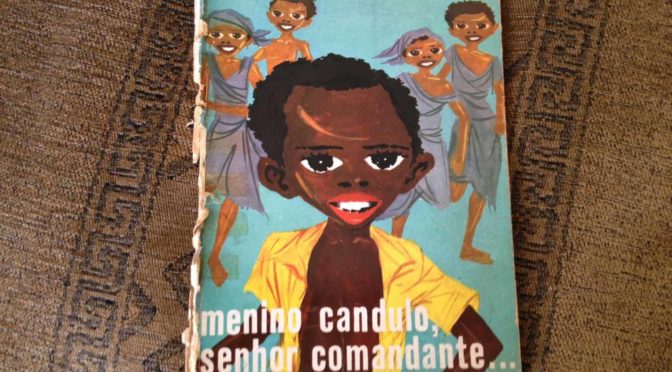Day 4’s assignment is to write about a loss: something (or someone) that was part of your life, and isn’t any more. What’s important is reflecting on this experience and what it meant for you — how it felt, why it happened, and what changed because of it.
This post is not coming easily to me. Almost a year ago my Uncle Guilherme passed away. Last night my Aunt Salome died. When my Uncle passed on my Aunt honoured his memory on her Facebook page. Today many of her friends are honouring her memory on her Facebook page. They were not related as they came from different sides of the family.
Both loved books. My Uncle wrote books in Portuguese which were translated into other languages. My Aunt adored books and read in many different languages. Both were children of Mozambique.
In April of 1974 my Uncle, Guilherme de Melo wrote a book called “Menino Candulo Senhor Comandante”. This is the translation of his dedication page:
“Everything in life has an explanation. A why.
The why of this book then – it is for the little people, but one which adults can also read – simple.
It happened that, one day, I arrived at the family home for dinner, like all human beings, citizens or not – naturally do. My young great-nieces were playing with each other. The youngest, almost five years old, busied herself with colouring-in books. The eldest read fables with fairies and dragons – she was a playful eight year and in the third grade. My Mom, great-grandmother to both little girls, was very proud of her gifts which she loved telling visitors to the house about.
“Tio, why don’t you write a story for us?” the eldest asked me with a serious look on her face as soon as she saw me enter the house.
“But you’ve got so many books already with which you can entertain yourself and read aloud to your sister. ” I objected.
With a petulant expression on her face she said, “Oh! I’ve read them all. And the books Granny brings me all tell the same stories – princesses, witches, giants and the big bad wolf…But why is it that there are no stories for children that take place in THIS country Tio…?
They actually do. That same morning, the newspaper where I work had run such a story, a small insert sent from the correspondent in Vila Cabral:
“Five children from the area of the Luissa village, some 20 kilometres from Vila Cabral presented themselves to the Portuguese authorities. They had been kidnapped by Frelimo last May, together with a group of men and women. Candulo Bonomar, 11 years old, Anete Anjida e Lua Uinasi, both 9 years old, Adaima Aide, 6 years old and Abide Bara, were taken to Tanzania, where, on the northern banks of the Rovuma River, the kidnappers separated the adults from the children. The children and adults – it is not clear how many there were – were taken to the so-called “Escola do Macheje”. Candulo Bonomar planned an escape, telling his four friends about it. Under the pretense of going down to the river to wash their clothes, they made their escape. After walking through the bush for many days they came upon a Portuguese military patrol who took them to Pauila, and then to Macaloje. They were finally transported to Vila Cabral and Luissa where they are now.”
Newspapers sizzled with this news.
From which this book happened.
For all the children of my country to read. And the adults to meditate on it.”
My Aunt’s free-spiritness is something I will always remember and be inspired by.
My Uncle, Guilherme de Melo is the reason I write!
Notes: "Tio" is Portuguese for "Uncle". The country is Mozambique, until 1974 a colony of Portugal. A violent war was waged for many years, mainly contained in the north of the country. Frelimo was the liberation movement. Mozambique is now a democracy. Frelimo is the current party in government. Vila Cabral, Pauila, Macaloje, Luissa are all towns in Mozambique. I haven’t been able to get information on the Escola do Macheje which I assume was infamous. I don’t know what became of Candulo Bonomar and his 4 friends. A paucity of information on my Uncle exists on the web - I guess it is up to me to right this.

